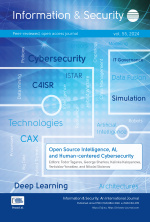Top downloads
| Title | Downloads |
|---|---|
The Potential Role of Women in Contributing to Countering Ideological Support for Terrorism: The Cases of Bosnia and Afghanistan |
(139) |
Border Security and Unmanned Aerial Vehicles |
(58) |
Countering Islamic Radicalism in Central Asiа |
(123) |
Issues of Interpreting the Koran and Hadith |
(128) |
Twenty First Century Defense Acquisition: Challenges and Opportunities |
(180) |
Emerging Technologies in the Context of “Security” |
(51) |
A Work in Progress: The United Kingdom’s Campaign Against Radicalization |
(98) |
Introduction to Program-based Defense Resource Management |
(166) |
Reaching Out to Muslim Clerics: Can We Build Bridges and Strengthen Moderate Voices in Islam? |
(120) |
An Assessment of Operation Safe Place |
(133) |
Capabilities-Based Defense Planning: Techniques Applicable to NATO and Partnership for Peace Countries |
(135) |
Combating Extremist Ideologies: Measuring Effectiveness-Considerations for Public Diplomacy |
(134) |
Strategic Communication: An Integral Component of Counterinsurgency Operations |
(145) |
The Long Shadow of History: Post-Soviet Border Disputes—The Case of Estonia, Latvia, and Russia |
(139) |
The Art of Shaping Defense Policy: Scope, Components, Relationships (but no Algorithms) |
(315) |
Countering Ideological Support for Terrorism in Europe: Muslim Brotherhood and Hizb ut-Tahrir – Allies or Enemies? |
(112) |
Global Islamism-Understanding and Strategy |
(135) |
Immigration and Terrorism: Moving Beyond the 9/11 Staff Report on Terrorist Travel |
(133) |
DCAF’s Activities in Support of Effective and Democratically Transparent Defense Planning |
(169) |
American Foreign Policy and Islamic Renewal |
(222) |
De-legitimizing Religion as a Source of Identity-Based Security Threats in a Global World |
(118) |
Border Security: Key Agencies and Their Missions |
(134) |
Planning and Development of Defense Institutions in a Time of Transformation |
(124) |
Countering Ideological Support for Extremism: Challenges and Implications |
(149) |
U.S./NATO-Russia and Countering Ideological Support for Terrorism: Toward Building a Comprehensive Strategy |
(104) |
Lessons Learned from the Establishment of Border Security Systems: General Information on Past, Present, and Future Activities |
(52) |
Editors’ Foreword |
(76) |
European Security and Private Military Companies: The Prospects for Privatized ‘Battlegroups’ |
(156) |
Post-Conflict Rehabilitation: From Aid to Development |
(98) |
Iran’s Nuclear Program: U.S. Options After the Elections |
(161) |
Russia’s Perception and Hierarchy of Security Threats |
(54) |
Why Is Post-Conflict Rehabilitation Important for Preserving and Developing Transatlantic Relations |
(59) |
Cooperative Security in the 21st Century |
(517) |
Conditions for Securitization of International Terrorism in Central Asia |
(141) |
The Post-Soviet Puzzle and Western Democracies |
(110) |
NATO Response Force: Rapid? Responsive? A Force? |
(508) |
The Role of the Armed Forces of the United Kingdom in Securing the State Against Terrorism |
(137) |
Disrupting Escalation of Terror in Russia to Prevent Catastrophic Attacks |
(139) |
The U.S. Approach to Combating Trafficking in Women: Prosecuting Military Customers. Could it Be Exported? |
(108) |
Counter-Terrorism Capability: Preventing Radiological Threats |
(106) |
A Neutral’s Perspective: The Role of the Austrian Armed Forces in Homeland Security |
(99) |
A Possible Path to Change in U.S.–Iran Relations |
(147) |
NATO Before and After the Second Gulf War |
(109) |
Fighting Human Trafficking in Bavaria |
(196) |
The Soviet Legacy: Transforming Bulgaria’s Armed Forces for Homeland Security Missions |
(174) |
Narcoterrorism in Southeastern Europe |
(120) |
Human Trafficking: Breaking the Military Link |
(202) |
Crisis Management: The Transformation of National and International Systems of Response |
(163) |
The Role of Italy’s Military in Supporting the Civil Authorities |
(198) |
Terrorism and Civil Aviation Security: Problems and Trends |
(122) |
